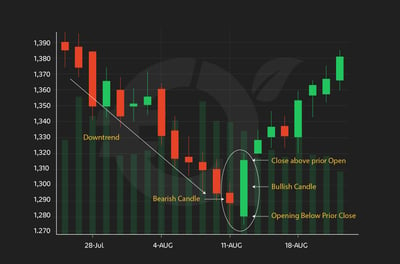Table Of Contents
- What Are Stocks?
- What is the Stock Market?
- Choosing the Right Investments: Key Considerations
- How to Choose Which Shares to Buy on The Stock Market
- How Do Analyze Financial Ratios?
- Price-to-earnings (P/E) ratio
- Price-to-sales (P/S) ratio
- Debt-to-equity ratio
- Return on equity (ROE)
- Dividend yield
- Types of Stocks and Shares
- What Are the Risks of Stock Trading?
- Market volatility
- Company performance
- Liquidity risk
- Inflation risk
- Regulatory risk
- The Pros and Cons of Stock Trading: What You Need to Know
- Pros:
- Cons:
- How To Start Trading Stocks Quickly
- Stock Trading Regulations
- The Bottom Line
The Best Way to Select the Shares to Buy on the Stock Market
In my opinion, investing in the stock market can be a smart move if you're looking to grow your wealth, but it's important to approach it with careful thought and planning. With so many top online stock brokers available, it can be overwhelming. That's why I've put together this article to provide you with a detailed strategy, expert advice, and top tips to help you make informed decisions when selecting stocks. Some of the information relates to stock events that took place in the last few years; regardless, the lessons remain valid.
Stock trading is an attractive option in today's retail marketplace, offering a variety of well-known indices from which to choose. Compared to other investment options like bonds or savings accounts, stocks generally provide higher returns over time. They are also highly liquid, meaning you can easily buy and sell them on stock markets worldwide, converting your shares into cash whenever necessary.
In this guide, I'll cover all the essential information you need to know about investing in stocks. We'll start with the basics, explaining how the stock market works and the fundamentals of stocks and shares. From there, I'll guide you through selecting the right investments, finding the best brokers, and managing your portfolio effectively. Whether you're a novice or have some experience, this guide will equip you with the knowledge and tools you need to navigate the stock market confidently.
Start with clarity on your investment goals and risk tolerance, decide whether you seek quick returns or long-term growth
Evaluate company fundamentals such as revenue trends profitability ratios debt levels and free cash flow to assess stability and growth potential
Analyze the industry context by selecting sectors with favorable trends or structural tailwinds that support future expansion
Assess the management team’s experience track record and strategic vision as leadership quality often drives long-term value
Identify companies with competitive advantages like patents
Review financial ratios including P/E debt-to-equity return-on-equity dividend yield and price-to-sales to compare valuation and financial health
Recognize risks such as market volatility liquidity constraints inflation and regulatory shifts and adjust portfolio exposure accordingly
Begin with a trusted broker that offers tools like screeners demo accounts research resources and regulatory protection before trading real capital
What Are Stocks?
I would say that when you decide to buy stocks, you're essentially becoming an owner of a publicly traded company. Stocks, which can also be referred to as shares or equity, represent ownership stakes in these companies. You can buy stocks outright or buy them via contracts for difference. The total value of a company's stock is divided into shares, and each share represents a portion of the company's assets.
Companies can issue new shares periodically, using the proceeds for operations, new projects, or dividend payments to shareholders. When you invest in stocks, whether you're an individual investor or part of the retail market, you can benefit from a stock's growth in value over time or receive dividends.
Stock trading takes place on exchanges, where buyers and sellers come together to trade. The value of a share is primarily determined by the forces of supply and demand in the market. Investors constantly negotiate prices based on factors such as the company's financial performance, industry trends, and economic news that can impact the overall market. These variables play a significant role in determining a share's value at any given time.

What is the Stock Market?
When a company that is publicly listed on the stock exchange needs additional funds, it can raise capital by selling some stocks of the company to investors and everyday retail traders. These shares represent a portion of ownership in the company and can be bought and sold on the stock market. The stock market serves as a platform where individuals can trade shares in various companies.
For traders, the objective of investing in stocks is to purchase shares in companies that have the potential to perform well in the future. The goal is to sell those shares at a profit when their value increases. There are several prominent stock indices globally, which include:
• S&P 500: This index tracks the market capitalization of 500 of the largest companies listed on the US stock exchange.
• Dow Jones Industrial Average (DJIA): This index reflects the performance of 30 top-tier industrial and manufacturing companies in the US.
• NASDAQ Composite: This index measures the performance of over 3,000 companies listed on the NASDAQ stock exchange.
• FTSE 100: This index represents the 100 largest and most prestigious companies listed on the London Stock Exchange in the UK.
• Nikkei 225: This index is based on the performance of 225 high-quality companies listed on the Tokyo Stock Exchange in Japan.
• Shanghai Composite: This index tracks the performance of both A-shares and B-shares listed on the Shanghai Stock Exchange in China.
• Euro Stoxx 50: This index represents the performance of 50 blue-chip companies from Eurozone countries.
Retail investors closely follow and actively trade these indices. They serve as important benchmarks to evaluate market performance and assess the success of different investment portfolios.
Choosing the Right Investments: Key Considerations
In my trading experience, there are several crucial factors to keep in mind:
First and foremost, I would urge you to consider your investment goals. Are you seeking long-term growth or aiming for quicker returns? Being clear about your objectives helps determine which types of stocks and shares align with your trading strategy.
Next, assess your risk tolerance. Trading in financial assets carries inherent risks, so it's crucial to invest only money you can afford to lose. If you prefer a more cautious approach, you might consider investing in safer stocks or diversifying your portfolio with other investment options like bonds or real estate.
Lastly, conduct thorough research. Before investing in any stocks or shares, it's essential to delve into the company's details and financial reports as much as possible. Look for companies with a proven track record of growth and a stable financial position.
By carefully considering these factors, you can make more informed investment decisions that align with your goals and risk management strategies. Remember, research and diligence play a vital role in selecting the right investments for your portfolio.
Once you've started to engage in stock trading, it's essential to stay informed and monitor your holdings regularly. Keep track of company news, earnings reports, and industry developments. Stay updated on macroeconomic trends and any factors that may impact your investments. Consider using stock screeners and financial news platforms, available from the best stocks brokers, to streamline your research process.
How to Choose Which Shares to Buy on The Stock Market
There are many important factors to consider when deciding which shares to buy on the stock market. In the rest of this section, I discuss a few common markers of company health and how they come together.
Company fundamentals
In my experience, this is one of the more enjoyable parts of being a trader, as I love to follow companies and their progress. You should evaluate the company's financial health, including revenue growth, profitability, debt levels, and cash flow. Not all traders have the financial savvy to effectively review company balance sheets, income statements, and cash flow statements. However, you can still gain insights into firms’ stability and growth prospects by following business news channels and investing Websites like Arincen.
Industry analysis
Examine the industry in which the company operates. Look for sectors with strong growth potential and favorable market conditions. In today’s market, artificial intelligence is a hot topic. Firms with an inside track on what it will take to support this industry, such as chipmaker Nvidia, are well set for the future.
Management team
Assess the company's management team if possible, its track record, and its ability to execute its business plans. Look for experienced leaders who have a clear vision for the company's future.
One example where this is in play is X. When new owner Elon Musk made controversial early moves after buying the company, this caused unrest with X’s advertisers. However, he is known as a formidable business leader with a track record of success. Backing him may not be the worst idea.
Competitive advantage
Identify the company's unique competitive advantages, such as patents, intellectual property, brand recognition, or economies of scale. In the case of Nvidia, as recently discussed, the chipmaker already possesses the necessary patents, manufacturing scale, and industry expertise to capitalise on an AI boom.
Also, don’t lose sight of how government actions help certain companies. The Biden administration has discouraged chip procurement from China, meaning that chipmakers in the US and other preferred locations are likely to benefit.
Market trends
As I've said, you should stay updated on current market trends and economic indicators. Consider how macroeconomic factors, such as interest rates, inflation, and geopolitical events, might impact the company and its industry.
One example could be the laptop industry. Softening global demand in the face of a possible recession in late 2022 meant that consumers were less inclined to upgrade their laptops as frequently. This trend led to poor earnings reports for these sectors by laptop manufacturers in the first quarter of 2023.
Here’s an example of how all this could come together. Study the graph that follows this explanation. You are considering whether to take a position in Company X, a mid-cap tech stock listed on the S&P 500. Instead of diving into the full set of financial statements, which can be complex, you rely on business news updates and trusted investing websites to guide your decision.
You read that after a period of sliding stock prices, Company X reports a 10% year-on-year revenue growth in its latest earnings release, with net profit margins expanding from 12% to 15%. Analysts highlight that the company has kept its debt-to-equity ratio under 0.4, showing conservative financing, while free cash flow has remained positive for five straight quarters.
This combination of revenue growth, improving profitability, low debt, and healthy cash flow convinces you that the company is financially stable and has room to expand. With the stock trading at $1280 per share, you decide to go long, setting a stop-loss at $1270 to manage downside risk and a take-profit target at $1380, aiming to capture potential upside from improving fundamentals.
Over the next month, upbeat analyst coverage and continued sector strength push the stock higher. When it reaches $1380, you close the trade, locking in a 9.2% gain from your entry.
In this example, the decision to trade wasn’t based on raw balance sheet analysis but rather on following reliable financial news, profitability trends, and key ratios that signal a company’s health and growth prospects.

How Do Analyze Financial Ratios?
Many financial ratios offer valuable insights into a company's financial performance and facilitate comparisons with other companies. Some key ratios to consider include:
Price-to-earnings (P/E) ratio
The P/E ratio compares the stock's price to its earnings per share (EPS) and helps determine whether a stock is overvalued or undervalued relative to its earnings potential. Watch out for hype stocks, particularly in the technology sector, whose potential is sometimes overplayed. The same could be said about some unicorn crypto stocks.
Price-to-sales (P/S) ratio
The P/S ratio compares a company's market capitalization to its revenue. It helps assess the company's valuation compared to its sales. Electric automaker Rivian has a flat P/S ratio as its market cap is currently low and its sales are constrained by cash flow and production constraints. Yet, at the same time, investors feel positive about electric vehicle manufacturers as the stocks of the future.
Debt-to-equity ratio
This ratio measures a company's leverage by comparing its total debt to its shareholders' equity. Lower debt levels indicate a more financially stable company. Watch out for stocks that are highly leveraged. Manchester United is an attractive stock on the face of it, but its management has never been able to lower the vast amount of debt that was used to purchase it.
Return on equity (ROE)
ROE measures a company's profitability by assessing how efficiently it utilizes shareholders' equity. Higher ROE signifies better profitability. This is a reliable measure for mature firms that have had enough time to concentrate on increasing profitability. It is a less sure way of ranking start-up firms as they are usually still in the process of fine-tuning their market model.
Dividend yield
If you're seeking income generation while stock trading, consider the dividend yield—the ratio of dividends paid per share to the stock's price. Look for stable or growing dividends. In some cases, large diversified conglomerates like 3M, GE, and Siemens provide the kind of stable yet pedestrian dividend yields that could attract risk-averse investors.
Recommended Brokers
Types of Stocks and Shares
I would point out that there are two primary kinds of shares that you can buy as a retail trader: common stocks and preferred stocks.
Common stocks are the more widespread type of stock. They represent ownership in a company. These stocks normally give higher potential returns than preferred stocks. However, they come with more risks.
Preferred stocks also represent ownership in a company, but more commonly offer a lower rate of return than common stocks. The upside of preferred stocks is that they come with lower risk than common stocks. Both types of stocks can be good investments, depending on your investment goals and risk tolerance.
What Are the Risks of Stock Trading?
In my view, stock trading can be a potentially profitable venture, but it's important to recognize that it comes with its fair share of risks. Here are some of the main dangers of online trading you should be aware of:
Market volatility
Share prices can change rapidly in response to breaking news or market events. If you're not closely monitoring your positions, you could experience significant losses. On the flip side, you might also have the chance to make substantial gains.
Company performance
Factors like management changes, product failures, or regulatory shifts can lead to a decline in a stock's value. It's crucial to stay informed about the companies you invest in.
Liquidity risk
While stocks are generally liquid, there may be instances when it's challenging to sell stock due to low trading volumes or unfavorable market conditions, especially when there's a lack of buyers during uncertain times.
Inflation risk
Inflation can erode the value of your investment over time, limiting the purchasing power of your returns. It's essential to consider inflation when assessing the potential long-term growth of your investments.
Regulatory risk
Stocks are subject to regulations in many countries. Failing to comply with regulatory requirements can lead to penalties and legal consequences.
Stock trading entails risks and requires careful risk management strategies and market expertise. Never invest more than you can afford to lose, and always educate yourself about the potential dangers before entering into this type of trading.
The Pros and Cons of Stock Trading: What You Need to Know
As attractive as stock trading can be, I would caution would-be traders to consider the pros and cons before diving in. Here's a breakdown of some potential benefits and drawbacks of stock trading:
Pros:
You can make good money: Stocks have a history of offering high returns, especially over the long term. They have outperformed many other investment options, but it's crucial to effectively manage your stock portfolio.
Diversification: Diversifying your portfolio is a widely advocated strategy in the trading world. By investing in various companies across different indices, you can protect yourself from losses when one type of trading falters.
Liquidity: Stocks are generally highly liquid, meaning they can be easily bought and sold on stock exchanges. This liquidity allows investors to convert their holdings into cash swiftly if needed.
Line of sight: Publicly traded companies are required to be transparent about their performance due to their stock being traded on the open market. This transparency, coupled with regulation and oversight, provides investors with clear information when deciding whether to invest in a particular firm.
Opportunities for active trading: Stocks offer numerous opportunities for active trading, appealing to individuals who enjoy short-term gains through buying and selling based on market fluctuations and breaking news.
Cons:
Market volatility: Stock prices can be highly volatile, responding rapidly and unpredictably to factors such as economic conditions, company news, or geopolitical events.
Company risks: Stock prices are heavily influenced by a company's performance and how investors perceive its products and services. Internal factors like management decisions and product updates can impact share price performance.
High risks: Stock trading involves inherent risks, such as high leverage, volatility, and the potential for losses exceeding the initial investment. For instance, in 2022, Meta, the parent company of Facebook, experienced a significant decrease in share value after announcing its new venture, the Metaverse, as investors questioned its viability.
Complexity: Investing in stocks requires a solid understanding of financial markets, which demands time and effort to research companies and stay updated with market news.
No guarantees: Like any financial instrument, investing in stocks carries risks, and no one can guarantee a profit. Stock prices can also decline rapidly, leading to substantial losses for investors.
It's important to note that these pros and cons may affect individual investors differently. The level of risk will vary based on factors such as financial goals, risk tolerance, and investment strategies. As with any investment, conducting thorough research, diversifying your portfolio, and staying informed are key steps to making informed decisions in the stock market.
How To Start Trading Stocks Quickly
In my experience, for new traders, it's understandable that the prospect of becoming a trader can feel overwhelming. Jumping into stock trading without understanding the basics can be risky. When considering how to go about stock trading, there are online stock brokers that can support you with educational resources and tools to make your journey smoother. Here's a typical path you can expect to follow:
Opening a brokerage account is a quick and convenient process. You simply visit the broker's website and click on the "Open account" button. After carefully reading and accepting the terms and conditions, you proceed to select your account type, provide information about your trading experience, and submit the required standard documentation for approval.
Many brokers offer demo accounts, which are extremely helpful for beginners. These demo accounts allow you to practice your trading strategies without risking real money. Typically, demo accounts come with virtual funds that give you the opportunity to familiarize yourself with the broker's trading platform and tools, especially its technical analysis section. It's a great way to gain confidence and get comfortable with the trading ecosystem.
Once you've practiced on the demo account and feel ready to proceed, you can fund your trading account. This involves depositing real money that you can use to buy and sell stocks. Each broker will have its own funding options and minimum deposit requirements, so make sure to review those details.
By following these steps, you can gradually ease into the world of stock trading, learning and practicing along the way. Remember, it's important to choose a reputable online stock broker that provides educational materials and tools to support your journey as a beginner.
Stock Trading Regulations
Stock trading has been a longstanding practice that is legally permitted in all major markets. However, it's worth noting that Sharia traders have a restriction on purchasing shares of companies involved in activities considered haram, such as alcohol production or gambling.
In terms of regulation, all brokers must adhere to oversight by a prominent regulatory body. Common regulators include the Financial Conduct Authority (FCA) in the UK, the Cyprus Securities and Exchange Commission (CySEC) for brokers in Cyprus, the Australian Securities and Investments Commission (ASIC) in Australia, and the Securities and Exchange Commission (SEC) for brokers in the United States.
Regulators play various roles, but their primary function is to ensure that brokers within their jurisdiction are registered and operate according to a set of rules and standards. Some regulators also possess disciplinary powers over regulated entities and individuals associated with them. Additionally, regulators often require companies with publicly traded securities to provide periodic reports. Considering this oversight, it is generally advisable to choose a broker regulated by a top-tier regulatory authority for the best protection and adherence to industry standards.
The Bottom Line
In my opinion, investing in stocks and shares can be an exciting way to grow your wealth in the long run. The best online brokers for stocks, which have been around for a while and are well-regulated, constantly strive to enhance their products and improve the trading experience for their clients. They offer immersive platforms and provide valuable market analysis, making them a reliable choice for investors.
Thanks to advancing technology, trading stocks online has become increasingly rewarding. However, it's important to remember that, like any investment, stock trading has its downsides. One significant drawback is the risk of losing a substantial amount of money quickly, given the inherent risks. Nevertheless, by conducting thorough research beforehand and implementing robust risk management strategies, you increase your chances of achieving success in the market.
FAQ
When you buy stocks and shares, you're essentially purchasing a piece of ownership in a company. It means you have a small stake in that company's ownership.
To get started, you need to open an investment account with a broker. You can easily do this online or in person. Once your account is set up and funded, you can begin buying and selling stocks and shares.
There is actually no difference between a stock and a share. These terms are used interchangeably and both refer to ownership in a company. Another term for ownership is equity.
There are various approaches to selecting stocks and shares, such as fundamental analysis, technical analysis, and following market trends. It's important to do your research and choose stocks that align with your investment goals and risk tolerance.
While trading costs are important for active traders, many brokers now offer commission-free trades for stocks and ETFs. However, it's not just about fees. You should also consider factors like the broker's product portfolio and trading platform. Don't base your decision solely on price and end up with limited functionality.
Thanks to zero-commission online stock trading and fractional shares, you can build a diversified portfolio of individual stocks even with limited upfront funds. Make sure your broker offers these services as not all brokers do.
Different brokers have different minimum requirements based on the type of investment. Most mutual funds have minimum investments around $1,000, which can be costly. However, if your broker offers fractional shares, you can start with as little as $1. Research thoroughly before choosing a broker as account minimum requirements can vary.
It depends on where your broker is regulated. Brokers regulated by the FCA in the UK are protected by the Financial Services Compensation Scheme (FSCS). Similarly, American brokerage firms must be members of the Securities Investor Protection Corporation (SIPC). If you choose a broker with weak regulations, you may have no protection if the broker fails.
Consider factors like the amount of money you have, the types of assets you want to invest in, and your trading style. Account minimums, customer service, research materials, and more should also be taken into account when evaluating potential brokers.
Yes, earnings from stocks are taxable, just like profits from other types of investments such as FOREX and cryptocurrency. You'll need to report and pay taxes on your trading profits.
Once you click the "open account" button on your broker's website and complete the Know Your Customer requirements, your account will be opened. After making a funds transfer, it may take a few days for the funds to show up in your broker's account. Once that's complete, you can start trading.






